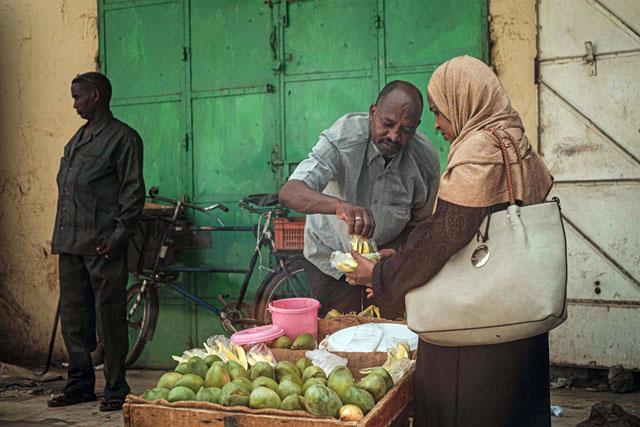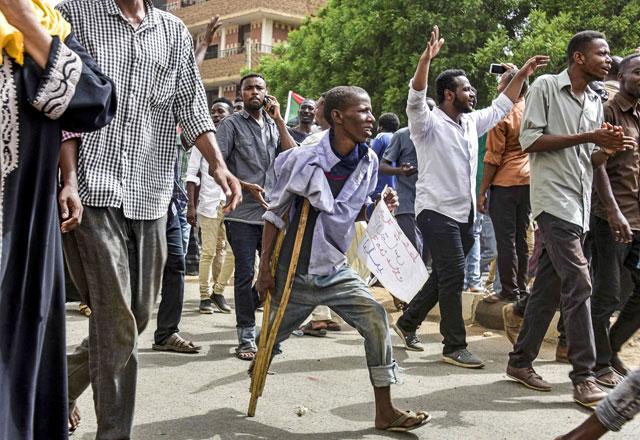You are here
Shops reopen as Sudan protesters agree to talks with generals
By AFP - Jun 13,2019 - Last updated at Jun 13,2019

Residents of Khartoum queue outside a bank to withdraw money in the Sudanese capital on Wednesday (AFP photo)
KHARTOUM — Shops and restaurants began to reopen in Sudan's capital Wednesday after demonstrators called off a nationwide civil disobedience campaign and agreed to new talks, though many residents remained indoors after last week's deadly crackdown.
The apparent breakthrough in the standoff between the military rulers who toppled veteran leader Omar Al Bashir and protesters demanding civilian rule followed mediation led by Ethiopian Prime Minister Abiy Ahmed.
Diplomatic efforts to resolve the crisis — triggered by a June 3 crackdown on protesters that killed dozens — got a boost as the US assistant secretary of state for African affairs, Tibor Nagy, arrived in Khartoum on Wednesday, officials said.
This came after an Ethiopian envoy sent by Abiy announced on Tuesday that the protest leaders and the ruling military council had agreed to resume talks and that a three-day civil disobedience campaign was ending.
Negotiations collapsed last month because the two sides disagreed about whether a civilian or soldier should head a new governing body.
On Wednesday morning an AFP correspondent who toured parts of the capital saw buses waiting for passengers at their stations, while shops in some districts reopened.
Later in the day several restaurants reopened and street vendors came back to work.
But the main gold market in central Khartoum remained shut, and many residents stayed indoors.
Heavy security
"I'm still staying at my home because I'm worried about the presence of security forces carrying guns on the streets," said Samar Bashir, an employee of a private company.
The paramilitary Rapid Support Forces — accused of playing a leading role in last week's crackdown — continued to patrol districts in their trademark pickup trucks fitted with heavy machine guns.
Other residents told AFP that they stayed at home because Internet services — heavily cut in recent days — were still not fully restored, making office work difficult.
Street sweepers cleared piles of trash, while long queues at bank cash points returned across the capital and other towns.
“I went to the bank with a cheque and they said there’s no money. It seems all the money is just finished,” Faisal Suleiman told AFP as he stepped out of a bank in Khartoum.
Sudan has been led by a military council since the generals ousted Bashir on April 11 after months of nationwide protests against his three decade rule.
After Bashir’s fall, protesters remained encamped outside military headquarters in Khartoum for weeks to demand civilian rule, until security and paramilitary forces moved in to disperse them on Monday last week.
Around 120 people have been killed since the crackdown began, according to doctors close to the protesters. The health ministry has acknowledged 61 people died nationwide.
The protest movement had initially threatened to pile more pressure on the generals by publishing a list of proposed members of a new ruling body — the key point of dispute between the two sides — before backing down.
“The Alliance for Freedom and Change agreed to end the civil disobedience [campaign] from today,” Mahmoud Drir, an Ethiopian diplomat who mediated talks on behalf of Abiy, told reporters on Tuesday.
“Both sides have also agreed to resume talks soon.”
The protest movement called on its supporters to resume work from Wednesday.
The generals have not yet commented on this development.
Global diplomatic push
The UN Security Council on Tuesday urged all sides “to continue working together towards a consensual solution to the current crisis” and voiced support for African-led diplomatic efforts.
It also called for an immediate halt to attacks against civilians and stressed the importance of upholding human rights — a week after Russia and China blocked a similar draft statement on the crisis.
US envoy Nagy is expected to hold several meetings with the generals and protest leaders, and also intends to visit Addis Ababa to discuss the Sudan crisis with Ethiopian leaders and the African Union.
The African Union suspended Sudan’s membership on Thursday.
Nagy “will call for a cessation of attacks against civilians and urge parties to work toward creating an enabling environment” for talks to resume, the State Department said earlier this week.
The United States has led calls for a civilian-led transition even as its Arab allies Egypt, Saudi Arabia and the United Arab Emirates appear to back the generals, experts say.
Related Articles
KHARTOUM — The United States Wednesday named a special envoy to Sudan to find a “peaceful” solution between demonstrators and gene
KHARTOUM — US and African Union diplomats stepped up efforts Thursday to find a peaceful solution to a standoff between Sudan's protesters a
KHARTOUM — Sudan's protest leaders Wednesday agreed to hold direct talks with the country's ruling generals after African Union and Ethiopia














